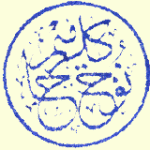-
The Adab of Sunna
By Sh. Nuh Keller
Categories : Sufism
1. It is of the sunna to be afraid for one’s past, one’s state at death, for calamities, and for treachery and disgrace. It is of the sunna to be patient and steadfast in worship, in blessings, in tribulations, and in divine punishments in one’s body, reputation, family, or money. It is of the sunna to have firm patience in avoiding sins, and to make up for one’s past misdeeds.
2. It is of the sunna to intend worship and obedience to Allah by one’s intention, deeds, words, and one’s every movement and rest; and to be indifferent to this world and desirous of the next, and to reflect carefully upon how one is now, and shall be then, and upon one’s being mustered on the Last Day, being raised from the dead, and questioned. It is sunna to hope that one’s obedience will be accepted, as well as one’s repentance from disobedience, and to be satisfied with what one has, and be contented with what is generally considered enough for a person, without extravagance and without penury.
3. It is obligatory to be contented with what Allah Most High has destined when it is of His acts, such as illness, disease, poverty, malady, loss of intellect, and so forth; though some say it is but the sunna to be contented with such things, and that what is obligatory is that one have patience with them. As for acts of human beings that Allah has forbidden, such as unbelief and misguidance, contentment with them is unlawful by consensus (ijma‘) of all scholars, for contentment with unbelief and acts of disobedience is itself unbelief and disobedience.
4. It is permissible to weep for the dead provided one does not commit unlawful things such as calling out to the deceased in lamentation as if he were alive and enumerating his great qualities, or wailing, or bitterness a what Allah has destined and necessarily appointed, or despair which contravenes one’s servitude and submission to Him. It is praiseworthy to weep for the deceased out of mercy for him, as the Prophet (Allah bless him and give him peace) said of weeping when he wept for the dead, “This is a mercy Allah has placed in the hearts of His servants”—for it does not negate being content with Allah’s destiny—as opposed to weeping over him because of one’s own loss at no longer having him, which is unpraiseworthy. Al-Fudayl, when his son died, laughed. He said, “I saw that Allah had destined it, and I wished to be pleased with what Allah had destined.” And this is a good state in relation to those who despair. As for mercy towards the deceased, satisfaction with destiny, and praising Allah, which was the state of the Prophet (Allah bless him and give him peace), it is more perfect.
5. Patience with one’s personal trials is obligatory by consensus of all the intelligent. As for acceptance of them, it is spiritually higher and closer to Allah to have contentment with them, though not obligatory. Even higher than contentment is to give thanks to Allah for them because of the divine blessing in them, in view of the reward and spiritual ascent in them if one has patience with them. It is unlawful for someone in disobedience to accept his remoteness from Allah. And it is not obligatory for someone being punished by Allah to have contentment with it.






